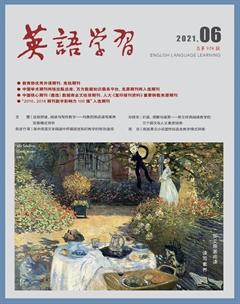《论语》中的“教”与“诲”及其英译
摘 要:本文重点讨论了《论语》中“教”与“诲”二字的区别及其在英译时的不同处理,旨在厘清这两个不同的概念,以免在对外宣传或翻译中出现偏差。
关键词:《论语》;“教”;“誨”;《论语》翻译
孔子通常被国人奉为“成功教师”。有教育专家认为,中国从古到今,真正成功的“为师者”只有孔子一人而已。孔子之所以能成为大家口中最成功的教育家,除了“学而不厌”的治学精神和“诲人不倦”的教育精神外,更重要的是他对弟子精心细致的培养、全心全意的关爱、诚心诚意的指导。孔子的这些精神和行为,当今仍然值得为师者学习和效仿。
我平时注意收集和阅读有关《论语》的书籍,但只是走马观花,读得并不深入。这次有机会读到美国学者金安平译注、香港城市大学鄢秀博士翻译的《论语英译及评注》及上海外国语大学教授史志康老师的《论语翻译与阐释》两书,激起了我重读《论语》及其英译本的兴致。我主要读了赵纪彬先生的《论语新探》及香港中文大学中国文化研究所刘殿爵先生的《论语》英译本。本文则是一篇关于《论语》中的“教”与“诲”两字的解释和英译的札记。
赵纪彬先生的《论语新探》,原名为《古代儒家哲学的批判》,出版于1948年,后来又出过三个新版(1958年、1962年、1976年)。最后一版是“文革版”,我手头就是这一版。李零先生(2007)在《丧家狗:我读〈论语〉》一书中对此书的评价是:“文革版”当然有时代的烙印,很多人以政治原因弃而不读,但其研究水平实远高于时下的流行新作,很多细节的考证至今仍有参考价值。
据赵纪彬先生(1976)考释,今日所谓“教育”,在《论语》中不名“教”而名“诲”,其中“教”与今日所谓“教育”,字面虽同,但实质大有区别,不能混同,《论语》也从未混用。兹将言“诲”、言“教”各章分组录释如下。英文译文分别采用了刘殿爵、Arthur Waley、辜鸿铭和金安平四位先生的译本,我根据赵纪彬先生的考释对译文略作评价,供读者参考。
言“诲”组
1.《为政》:由,诲女知之乎?知之为知之,不知为不知,是知也。
The Master said, “You, shall I tell you what it is to know. To say you know when you know, and to say you do not when you do not, that is knowledge.”(刘殿爵译)
The Master said, “Yu, shall I teach you what knowledge is? When you know a thing, to recognize that you know it, and when you do not know a thing, to recognize that you do not know it. That is knowledge.”(Arthur Waley译)
Confucius said to a disciple,“Shall I teach you what is understanding? To know what it is that you know, and to know what it is that you do not know, —that is understanding. ”(辜鸿铭译)
The Master said, “You, do you know what I have been trying to teach you? To say that you know something when you know it and to say that you do not know something when you do not know it— that is true knowing.”(金安平译)
上述英译中里,除了刘殿爵先生把“诲”字译为tell外,其他人都译为teach,对“诲”字的理解和翻译都没有问题。
2.《述而》:默而识之,学而不厌,诲人不倦,何有于我哉?
The Master said, “Quietly to store up knowledge in my mind, to learn without flagging, to teach without growing weary. For me there is nothing to these things.”(刘殿爵译)
The Master said, “I have listened in silence and noted what was said, I have never grown tired of learning nor wearied of teaching others what I have learnt. These at least are merits which I can confidently claim.”(Arthur Waley译)
Confucius then went on to say,“To meditate in silence; patiently to acquire knowledge; and to be indefatigable in teaching it to others; which one of these things can I say that I have done?”(辜鸿铭译)
The Master said, “To retain knowledge quietly in my mind, to learn without ever feeling sated, not to weary of teaching—these things are not a problem for me.”(金安平译)
3.《述而》:若圣与仁,则吾岂敢?抑为之不厌,诲人不倦,则可谓云尔已矣。
The Master said, “How dare I claim to be a sage or a benevolent man? Perhaps it might be said of me that I can keep at it without getting tired and go on teaching without growing weary.”(劉殿爵译)
The Master said, “As to being a Divine Sage or even a Good Man, far be it from me to make any such claim. As for unwearying effort to learn and unflagging patience in teaching others, those are merits that I do not hesitate to claim. ”(Arthur Waley译)
Confucius then went on to say,“And as for the character of a holy, sainted man or even a moral character,—how should I dare to pretend to that. That I spare no pains in striving after it and am indefatigable in teaching others to strive for it. —that, perhaps, may be said of me. ”(辜鸿铭译)
The Master said, “I dare not call myself a sage or a humane man. What could be said of me is that I work toward it without ever feeling sated and I am never tired of teaching.”(金安平译)
4.《述而》:自行束脩以上,吾未尝无诲焉。
The Master said,“I have never denied instruction to anyone who, of his own accord, has given me so much as a bundle of dried meat as a present.”(刘殿爵译)
The Master said,“From the very poorest upwards—beginning even with the man who could bring no better present than a bundle of dried flesh—none has ever come to me without receiving instruction.”(Arthur Waley译)
Confucius remarked,“In teaching men, I make no difference between the rich and the poor. I have taught men who could just afford to bring me the barest presentation gift in the same way as I taught others.”(辜鸿铭译)
The Master said, “I have never refused to teach anyone who, on his own, has bought me a bundle of dried meat on his first visit.”(金安平译)
5.《宪问》:爱之,能勿劳乎?忠焉,能勿诲乎?
The Master said, “Can you love anyone without making him work hard? Can you do your best for anyone without educating him?”(刘殿爵译)
The Master said, “How can he be said truly to love, who exacts no effort from the objects of his love? How can he be said to be truly loyal, who refrains from admonishing the object of his loyalty?”(Arthur Waley译)
Confucius remarked, “Where there is affection, exertion is made easy; where there is disinterestedness, instruction will not be neglected.”(辜鸿铭译)
The Master said, “When you love someone, how can you not encourage him to work hard? When you want to do your best for someone, how can you not try to instruct him to do the right thing?”(金安平译)
赵纪彬先生(1976)认为,在《论语》里,“人”是统治阶级,“民”是被统治阶级。总此五例,足证孔门只对“人”言“诲”,不对“民”言“诲”(《论语》明言“诲人”,而全书无“诲民”之词),只以“人”为“诲”的对象,不以“民”为“诲”的对象。“诲”概念是以“人”为对象,以“忠”为动机,以“不倦”为精神,以“行束脩”为条件,以“知”为内容,以“平等”关系为媒介,务令所诲之“人”“学而不厌”、 习为君子。和刘殿爵先生一样, Arthur Waley、 辜鸿铭和金安平也都把“诲”译成teach、educate、instruct、admonish,这些都没有错。这里需要特别提一下金安平教授(2019)的观点:“诲”需要诠释,孔子谈及自己传道授业,喜欢用“诲”这个字。金教授指出孔子本可以用其他词,比如“训”或“教”,但“训”的意思是“说释而教之”,而“教”是“上所施”,这两个词都不符合孔子的教学理念。金教授(2019)还引了《说文解字》中对“诲”字的解释,即“明晓而教之”。
言“教”组
1.《为政》:季康子问:使民敬、忠以劝,如之何?子曰:临之以庄则民敬,孝慈则民忠,举善而教不能则民劝。
… raise the good and instruct those who are backward and they will be filled with enthusiasm.(刘殿爵译)
… promote those who are worthy, train those who are incompetent; that is the best form of encouragement.(Arthur Waley译)
… advance those who excel in anything and educate the ignorant, and the people will exert themselves.(辜鸿铭译)
… acknowledge the good, teach the incompetent, and the people will encourage each other to strive forward. (金安平译)
2.《述而》:子以四教:文、行、忠、信。
The Master instructs under four heads: culture, moral conduct, doing ones best and being trustworthy in what one says.(刘殿爵译)
3.《子路》:(冉有)曰:既富矣,又何加焉?(孔丘)曰:教之。
Ran You said, “When their circumstances have been improved, what further benefit can one add?”Confucius replied,“Train them.”(刘殿爵译)
4.《子路》:善人教民七年,亦可以即戎矣。
After a good man has trained the common people for 7 years, they should be ready to take up arms.(刘殿爵译)
5.《卫灵公》:有教无类。
In instruction there is no grading into categories.(刘殿爵译)
6.《尧曰》:不教而杀谓之虐。
To impose the death penalty without first reforming the people is to be cruel.(刘殿爵译)
限于篇幅,此处不一一列举所有的英译文。诸家译文有把“教”译成teach、educate和instruct的,也有译成train或reform的,这些都需要进一步商榷。“诲”以“人”为对象,而“教”则以“民”为对象;并且受教者为“民”,而“教民”者为“人”(这一点从“善人教民”一语中能很好地体现出来);字书释“教”为“上所施下所效”,与此义正合。“诲”常和“学”“知”相连,“教”则只与“戎”“战”相连;足证“教”不以启发知能为目的,而以军事技术为内容。《论语》中的“教”不是“教育”,而是“教练”。所以,“教”字英译为train比较合适。另外,赵纪彬先生(1976)认为,“有教无类”一语,自来即多误解,而有意识的曲解亦复不少。他对此进行了详尽的考证,他说:实则此“有”字训“域”,《商颂·玄鸟》“奄有九有”,《韩诗》作“九域”,即为明证。此“类”字乃“族类”之“类”,《左传》“非我族类,其心必异”即是此义。依此,则“有教无类”即是说对于“民”实行军事教练,应按地域划分而不分族类,即打破民族纽带的界限,依照方舆本位,对本区域以内的奴隶一律实行军事教练,以适应公室征讨不德的需要。
元人王若虚在《滹南遗老集》里说,解《论语》者有三过焉,过于深也,过于高也,过于厚也。有人把“有教无类”理解为“有教养就不会有瑕疵/性格缺陷”,再译成英文“A person properly brought up has no character defect. ”。我觉得就有解之过深和过高的嫌疑。
参考文献
Arthur Waley,译. 1998. The Analects[M].北京: 外語教学与研究出版社.
辜鸿铭. 2013. 西播《论语》回译——辜鸿铭英译《论语》详释[M].王京涛,译注. 北京: 东方出版中心.
金安平, 译注. 2019. The Analects of Confucius[M]. 鄢秀,译. 桂林:广西师范大学出版社.
李零. 2007. 丧家狗——我读《论语》[M]. 太原: 山西人民出版社.
杨伯峻(今译), 刘殿爵(英译). 2008. Confucius: The Analects [M].北京: 中华书局.
赵纪彬. 1976. 论语新探[M]. 北京:人民出版社.
吴其尧,上海外国语大学英语学院教授。

